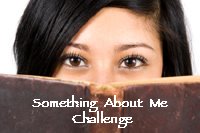 So finally, after a long long time of no book reviews, I am getting around to writing one for the "Something About Me" reading challenge. I still have a bunch to do, so I've got to get crackin.' I finished reading East of Eden by John Steinbeck over a month ago, but being the huge procrastinator I am, I am just now getting around to the review. I decided to read this book for the challenge because I don't normally read classics just for the heck of it, but I always feel that I should read them. So basically, I need a reason. When Vasilly listed East of Eden, a book which I had always thought I'd get around to reading some day, I decided that here was my reason.
So finally, after a long long time of no book reviews, I am getting around to writing one for the "Something About Me" reading challenge. I still have a bunch to do, so I've got to get crackin.' I finished reading East of Eden by John Steinbeck over a month ago, but being the huge procrastinator I am, I am just now getting around to the review. I decided to read this book for the challenge because I don't normally read classics just for the heck of it, but I always feel that I should read them. So basically, I need a reason. When Vasilly listed East of Eden, a book which I had always thought I'd get around to reading some day, I decided that here was my reason.East of Eden is about two families, the Trasks and the Hamiltons, their lives and how they intersect and affect one another. There is sibling rivalry akin to Cain and Abel, and love, or its absence, plays a pivotal role. Good and evil, and the measure of each in a person, is a continuous thread through the work. For me, this novel was not a fast read. It was not an edge-of-your-seat, have to know what happens next immediately type of read. It was interesting and satisfying, and at times surprising in its modernity. I'm not sure what I expected from a book written in the 50s and set in the late 1800s to early 1900s, but modern urban slang wasn't it. "Frigging" was used in place of "fucking" in one instance, and the word "crib" was used as a place to live, albeit one run-down and decrepit, whereas today it can mean any type of home. I also didn't expect a sociopath or a gang rape.
What I liked:
I liked the character Lee, the way he faked who he was to be what people expected, but then was able to be himself later, and his humble and wise ways.
I found it interesting that Steinbeck himself is a character in the novel. As a descendant of the Hamilton clan, the book is told as if he is telling the story, which made me wonder if, in fact, this is an autobiographical work. I quick perusal of the Internet, and consensus seems to be semi-autobiographical.
I liked A LOT of the observations Steinbeck makes throughout the novel. He inserts them seamlessly into the text, yet they easily stand apart from it. There are so many passages that I would like to quote here, but then this review would be entirely too long. So just one particular favorite:Our species is the only creative species, and it has only one creative instrument, the individual mind and spirit of a man. Nothing was ever created by two men. There are no good collaborations, whether in music, in art, in poetry, in mathematics, in philosophy. Once the miracle of creation has taken place, the group can build and extend it, but the group never invents anything. The preciousness lies in the lonely mind of a man.
Okay, one more:Humans are caught - in their lives, in their thoughts, in their hungers and ambitions, in their avarice and cruelty, and in their kindness and generosity too - in a net of good and evil. I think this is the only story we have and that it occurs on all levels of feeling and intelligence. Virtue and vice were warp and woof of our first consciousness, and they will be the fabric of our last, and this despite any changes we may impose on field and river and mountain, on economy and manners. There is no other story. A man, after he has brushed off the dust and chips of his life, will have left only the hard, clean questions: Was it good or was it evil? Have I done well - or ill?
There wasn't anything in particular that I recall that I didn't like. It was well-written and interesting. It was obvious why it is considered a classic.
What does this choice tell us about Vasilly? Well, I actually couldn't tell much from this one choice, but looking over all five of her choices, I think I can deduce that she is a spiritually oriented person, in that she looks within herself to her spirit and beliefs when faced with difficult situations. Am I close?


No comments:
Post a Comment